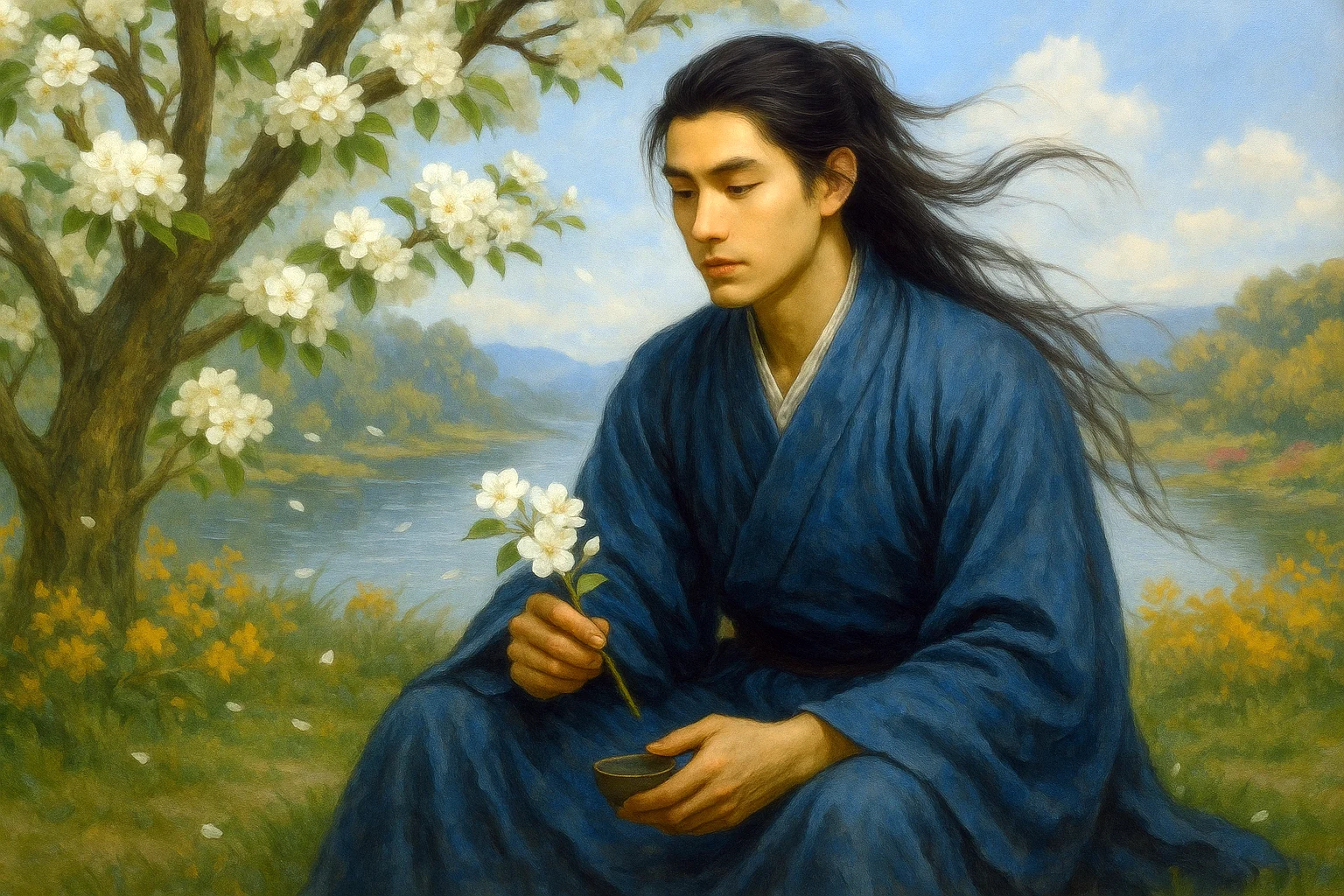Twelve peaks of Wushan rise,
suspended in the azure void.
Clouds entwine and hide the sinking sun,
and autumn rain drifts, laced with wind.
Chill cries of apes cross shivering waters;
the woods dissolve into the fading sky.
In sorrow, I gaze toward lofty Gaotang,
where the clear air of fall reveals the old Chu palace.
Original Poem
「巫山高」
李端
巫山十二峰,皆在碧虚中。
回合云藏日,霏微雨带风。
猿声寒过水,树色暮连空。
愁向高唐望,清秋见楚宫。
Interpretation
Composed during Li Duan's travels when gazing upon the Witch Mountains (modern Wushan County, Chongqing), this poem immortalizes the legendary peaks where King Xiang of Chu once dreamed of encountering a goddess. Blending crisp autumn scenery with mythic nostalgia, Li Duan crafts an ethereal landscape where nature and legend dissolve into each other—a masterpiece of Tang dynasty mountain-and-water poetry.
First Couplet: "巫山十二峰,皆在碧虚中。"
Wūshān shí'èr fēng, jiē zài bì xū zhōng.
Twelve Witch Mountain spires
Pierce the jade emptiness—
The opening lines stake the peaks' dominion over both earth and sky. "Jade emptiness" (碧虚) fuses color and void, rendering the mountains simultaneously tangible and divine—gateways between realms.
Second Couplet: "回合云藏日,霏微雨带风。"
Huíhé yún cáng rì, fēiwēi yǔ dài fēng.
Coiling clouds devour the sun;
Gossamer rain rides the wind.
Here, the mountains breathe: clouds "coil" (回合) like celestial serpents, while rain becomes a chiffon veil (霏微) stirred by unseen hands. This meteorological ballet echoes the goddess' legendary "morning clouds and evening rain," blurring nature and myth.
Third Couplet: "猿声寒过水,树色暮连空。"
Yuán shēng hán guò shuǐ, shù sè mù lián kōng.
A gibbon's cry chills the river;
Tree shadows merge with dusk's void.
Sound and sight conspire to deepen solitude. The primate's wail (猿声) carries glacial melancholy across water, while silhouetted trees (树色) bleed into twilight—an ink-wash painting come to life, where boundaries between solid and spectral dissolve.
Fourth Couplet: "愁向高唐望,清秋见楚宫。"
Chóu xiàng Gāotáng wàng, qīngqiū jiàn Chǔ gōng.
Gazing toward Gaotang now,
In autumn's clarity—Chu's phantom palaces.
The climax resurrects history through layered vision: the real autumn light reveals imaginary ruins. "Gaotang" (高唐) and "Chu palaces" (楚宫) conjure the goddess' vanished realm, making absence more palpable than presence. The poet's sorrow (愁) becomes a bridge across millennia.
Holistic Appreciation
The poem seizes the moment of ascending heights to gaze afar, depicting the ethereal autumn scenery of Wu Mountain—misty rain and clouds merging with treetops that seem to touch the sky—thereby evoking associations with the Gaotang myth and the bygone Chu palaces. Scenery blends with emotion, reality gives rise to fantasy. The towering height of Wu Mountain is not merely geographical but also symbolic and emotional, embodying nostalgia for ancient myths while reflecting the poet’s own melancholy and solitude.
Li Duan’s work inherits the romantic tradition of Chu Ci (Songs of Chu), combining Li Bai’s ethereality with Wang Wei’s serenity, making it a representative Tang-era poem on the theme of Wu Mountain. Nature, history, and emotion intertwine seamlessly; though ostensibly about landscapes, it is ultimately a meditation on human sentiment, showcasing Li Duan’s mastery of expressing emotion through objects.
Artistic Merits
- Grand opening, majestic atmosphere: The opening couplet immediately establishes an elevated perspective, placing Wu Mountain amid the "azure void," instantly expanding the poetic realm.
- Interplay of reality and illusion, movement and stillness: Rainclouds, wind sounds, ape cries, and twilight woods interweave—movement within stillness, substance within emptiness.
- Allusions, subtle lyricism: The closing couplet employs allusions to "Gaotang" and "Chu palaces," conveying emotion indirectly while enriching the poem’s cultural and historical depth.
- Progressive structure, meticulous composition: Transitioning from concrete to abstract, from immediate sights to distant relics, emotions unfold layer by layer in an orderly structure.
Insights
This poem reveals how landscapes are not merely natural phenomena but vessels of cultural memory and human emotion. Li Duan ascends Wu Mountain to reflect on past and present, gazes toward Gaotang to stir profound thoughts—exemplifying how literati channeled feelings through nature. When we read landscape poetry, we should also perceive the humanistic spirit and life’s contemplations embedded within—that poetic meditation on time’s passage and life’s vicissitudes amid majestic nature.
About the Poet

Li Duan (李端, c. 743–785), a native of Zhaoxian in Hebei Province, was among the "Ten Literary Talents of the Dali Era" during the Mid-Tang period. He excelled particularly in five-character regulated verse, crafting poetry of refined elegance and subtle nuance. His works frequently explored themes of reclusive living and the melancholy of separation, with over 250 poems preserved in the Complete Tang Poetry anthology.











